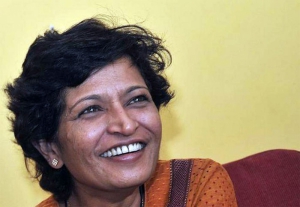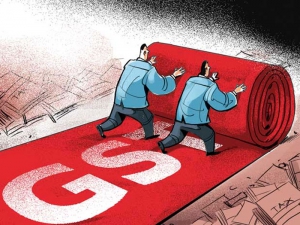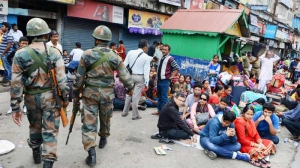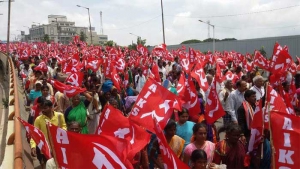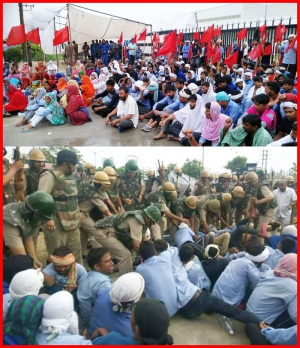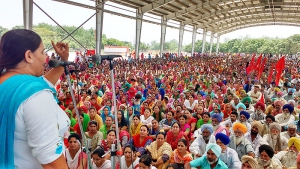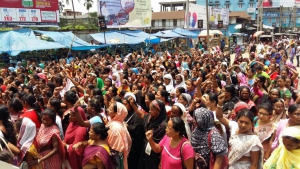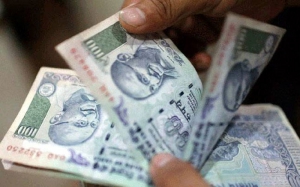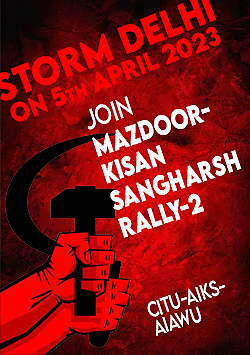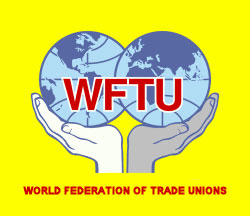Super User
CITU Condemns Murder of Gauri Lankesh
Centre of Indian Trade Unions (CITU) strongly condemns the brutal murder of noted journalist and activist Gauri Lankesh in front of her residence in Bengaluru yesterday. She was a critic of the communal forces of RSS.
This murder is the latest in the series of murders of rationalists like Govind Pansare, Narendra Dhabolkar and M.M. Kalburgi by these communal divisive forces to create terror against criticism of the Hindutva communal forces and among minorities.
CITU conveys its condolences to her family and colleagues. CITU demands of the Government of Karnataka to immediately arrest the culprits and unearth the conspiracy to silence the voices of reason.
CITU calls upon its members and the working class of the country to protest against this heinous crime and attack on secularism.
Issued by
A R Sindhu
Secretary
CITU welcomes Supreme Court judgment on Triple Talaq
CITU welcomes the majority judgment of the Supreme Court on the talaq e bidat type of triple Talaq. The Supreme Court pointed out that talaq e bidat type of triple talaq was arbitrary and was not intrinsic to Koranic tenets. The judgment is a step forward in the struggle for the rights of women.
This is a victory for the decades’ long struggle against the instant and arbitrary form of divorce through the talaq e bidat. Many Muslim women and democratic women’s organisations have played the leading role in this struggle. Many countries with Muslim majority populations do not have this practice.
CITU believes that this judgment will strengthen women’s struggle for their rights and for reform of personal laws of all communities to suit the present situation.
Issued by
Tapan Sen
General Secretary
WORKING COMMITTEE MEETING OF CITU Shimla : Resolution on GST
The Working Committee meeting of CITU, being held on 14-16 July 2017 at Shimla notes with serious concern the grievous impact of the GST launched by the Govt of India with much fanfare on 1st July 2017. The GST has adversely impacted the common people at large, particularly the workers in the unorganised sector, people engaged in small and decentralised manufacturing like tailoring, garments, textile, beedi, small drug manufacturing, construction, matches & fireworks and passenger & goods transport etc and also small traders. Even the insurance premium is not spared from high taxation. Normal activities in many of these sectors have been affected and/or collapsed leading to massive job losses. Tens of thousands of people, including traders and small manufacturers are coming out in spontaneous protests countrywide to voice their opposition to GST regime that threatens the viability of their occupations pushing them to virtual collapse. CITU members and cadres all over the country have joined the surging protest actions in a big way demanding relief and protection of employment.
The Working Committee of CITU notes the negative impact of the GST regime on small manufacturers, traders and the lakhs of workers employed in these establishments and fully appreciates the participation of the CITU cadres in the protests to express their anger and disapproval of the pro-corporate GST regime. The GST regime has also resulted in enormously higher burden of taxation on many essential commodities including medicines, making them costlier. It has imposed heavier burden on the mass of the people. This calls the bluff on the loud claims of the Govt that GST will result in reduction of prices. The GST regime has also subsumed the welfare related cess on non-coal mining, beedi, cine-sector etc, thereby taking away the welfare/social security related rights of the workers in concerned sector.
CITU also notes with serious concern the serious implication of the GST regime in severely undermining the federal structure of the Constitution, ultimately abrogating substantially the taxation related rights of the state governments. It makes the state governments more dependent on the central government in respect of resource generation and management. This is going to have serious adverse impact on the democratic set-up owing to greater concentration of resources and power with the central govt, promoting authoritarian trends.
CITU demands that the already heavy burden of indirect tax on the common people should not be allowed to cross the pre-GST levels. Instead, it must be lowered substantially on all essential commodities and it should be zero on all essential medicines. The cess-funded welfare benefits for the workers of beedi, mining, cine and other sectors should continue unhindered. At the same time, in the context of the post-GST impact on the people and various sectors of the economy, the GST regime warrants a thorough review and reconsideration.
The working committee of CITU calls upon the working class and CITU unions in particular to extend full solidarity to the emerging protests against the GST regime and its disastrous impact on workers and small traders/manufacturers. It calls upon all its committees to actively intervene in channelizing the anger and unrest among the people in different parts of the country into struggles against the anti-people and anti-worker and pro-corporate policies of the government.
CITU CONGRATULATES TEA GARDEN WORKERS OF WEST BENGAL
FOR HEROIC TWO DAY STRIKE ACTION ON 12-13 JUNE
CONDEMNS BARABARIC POLICE ATROCITIES ON THE STRIKING WORKERS
The Centre of Indian Trade Unions congratulates the tea garden workers of West Bengal for successful two-day strike action demanding enhancement and implementation of Statutory Minimum Wage. The strike was called by the united platform of Tea Garden workers in West Bengal, after the TMC-run Govt of West Bengal backtracked from its commitment for a negotiated settlement on enhancement of statutory minimum wage for the tea garden workers, as per dictate of the tea garden owners.
The strike was almost total on both the days in almost all the 300 tea gardens in the state spread-over three districts viz., Darjeeling, Jalpaiguri and Aliporeduar.
The TMC Govt in West Bengal took it as their prestige issue to break the strike at the dictate of the tea garden owners and unleashed brutal repression through its police machinery to break the strike, including chasing and hounding the workers in their colonies and drag them to their place of work in many gardens. But owing to united and determined resistance by the workers, police force failed to break the strike and in despair, unleashed brutal lathi-charge without provocation on the striking workers procession and mobilizations on both the days of strike, severely injuring many including a large number of women workers. Mass scale arrests of striking workers also took place and charges on non-bailable section was inflicted upon them. But in a number of cases, the militant demonstration by the workers enmasse before many police stations in the tea garden area, local police was compelled to release many of the arrested workers.
CITU condemns such barbaric assault and repression on the peaceful strike action by the tea-garden workers by the TMC Govt in the state at the behest of the tea garden owners. The State Govt never bothered when the tea garden workers were in the midst of starvation owing to unlawful closure of many tea gardens, illegal shut-down of production etc leading to hundreds of starvation deaths. But when the workers and their unions closed their ranks to fight back the profit hungry garden owners, the TMC Govt, instead of taking action against the garden owners for their habitual unlawfull activities, pounced upon brutally on the workers demanding proper wages. This exposes the brazenly anti-worker approach of the state govt acting virtually as agents of garden-owners.
CITU denounces such anti-worker policies of the Govt and salutes the heroic resistance by the garden workers at every stage, which is no doubt inspiring for the entire working class movement.
( Tapan Sen )
General Secretary
CITU EXTENDS SUPPORT FARMERS’ AGITATION
CONDEMNS BRUTAL POLICE REPRESSION ON FARMERS’ STRUGGLES
CALLS FOR JOINING COUNTRYWIDE PROTEST DAY BY FARMERS ON 16TH JUNE 2017
The Centre of Indian Trade Unions denounces the continuing repression on farmers’ struggle in various parts of the country on the their just livelihood related demands in the background aggaravating crisis in the agricultural economy owing to which small and marginal farmers are hardest-hit and also a large section of medium farmers.
The bankruptcy of the pro-landlord, pro-corporate policies of the Narendra Modi Govt is also exposed by the fact that even in the year of good crops, farmers’ suicides are continuing abated; Such is the situation created by the governance of the agrarian economy by the Govt through its policy and administration on procurement, so called Minimum Support Price (MSP), scant availability of institutional credit to farmers, increasing input cost etc, that even the gains of good-crop year, produced by poor farmers are being appropriated by the nexus money-lenders, big landlords, big corporate traders with the direct patronage of the neoliberal economy management throughout the country. In the year of crop failure, the situation continued to be more grim. Over and above, the Govt’s decision on ban on cattle trade has further added to distress and destitution of the farmers’ community imposing bigger burden on them besides snatching away their available avenue of crisis management.
When farmers community came out in thousands to agitate against the anti-farmer policies, demanding immediate relief, they are being sought to be suppressed through poilice brutality, particularly in the BJP-ruled states. CITU condemns the brutal killings of six farmers by Madhya Pradesh Govt.
In this background, the Bhoomi Adhikar Andolan comprising All India Kisan Sabha and other farmers’ organization, which is an integral part of the surging farmers struggle countrywide, has given a call for nationwide Protest struggle on 16th June 2017 demanding inter alia a)implementation of Swaminathan Commission’s recommendation on MSP, Comprehensive Loan waiver for farmers including the lowest strata, withdrawal of notification on ban on cattle trade and Resignation of the Madhya Pradesh Govt responsible for killing of six farmers.
Centre of Indian Trade Unions extends full support to the call of the Bhoomi Adhikar Andolan and their demands; CITU calls upon the workers throughout the country to join the initiative of Bhoomi Adhikar Andolan and All India Kisan Sabha in organizing the Nationwid Protest Action against the anti-farmer policies of the Govt on 16th June 2017
Issued by
( TAPAN SEN )
General Secretary
CITU Condemns the arrest and Detention of Aisin Workers and leaders of various organisations in Rohtak, Haryana
Haryana Government must not try to repeat ‘Maruti’
Centre of Indian Trade Unions strongly condemns the brutal lathicharge , arrest and detention of more than four hundred workers including 35 women of the M/s AISIN Automative Ltd located at Rohatak, Haryana. Besides the workers the leaders of various mass organizations who joined the struggling workers in solidarity were also arrested on 31 may 2017. CITU warns the BJP led Haryana Government that it has to face the united strength of the toiling people if it is trying to repeat ‘Honda’ or’ Maruti’ in Aisin or elsewhere in the state.
Aisin Automative Ltd is a Japanese Automative Company employing nearly 800 workers including women in IMT, Rohtak. The workers took initiative to form trade union and submitted application in the state labour department. But the labour department of the BJP led Govt in Haryana rejected the application without showing any reason and almost simultaneously, on 3rd May 2017, the management of AISIN Automotive terminated service of the 20 leading workers including four women without notice and showing any reason. When other workers enmasse protested such autocratic termination of their leaders, rest of the 700 workers were also sent out of the factory, directing them to join work only after giving a written undertaking not to join any union. Whatever happened in Maruti a couple of years ago, same thing has been repeated by the Japanese employer with the support of the Haryana Govt as its subordinate.
Since then the workers have been sitting in peaceful dharna before the factory gate in protest. In the scorching heat they are sitting directly under the Sun, which caused hospitalization of many employees, but it could not weaken the fighting spirit. CITU and many mass organisations and trade unions extended support to the workers. Assistant labour Commissioner called for negotiation three times but there was no outcome. On 23 May, a massive rally was held in support of the workers in Rohtak.
On 31 May, while workers were sitting peacefully in dharna before the factory gate, a large police force arrived at the spot and started brutal lathicharge on the workers injuring many. In the face of workers staying there facing the lathicharge, police resorted to mass scale arrests. 425 were arrested including CITU State leader Vinod, Youth leader Sandip and AIDWA leader Asha. They were charged with various section of IPC, produced before the magistrate at midnight and were detained for two weeks.
This is yet another example as to how the BJP Govt at Haryana, taking oath in the name of constitution trampled under feet their basic constitutional responsibility and promoted violation of laws of the land in most obedient service of the Japanese multinational; denying registration of the trade union is a serious offence committed by the Govt; terminating service of workers only for making effort to form trade union under Trade Union Act and insisting others to give undertaking on not to join trade union is also a grave offence committed by the employer; instead of taking action against the offending employer brutally beating the terminated workers sitting in a peaceful dharna under the scorching sun by Police is also a criminal offence.
CITU condemns these offenders of Indian Constitution –the BJP Govt in loyal service of Japanese employers and calls upon trade union movement and workers in general to extend support to the struggle of the AISIN workers and hold solidarity action statewide. The BJP Govt-employer nexus holding lives of the common people to ransom must be defeated and struggle must go on.
CITU demands immediate release of all workers and their leaders, unconditional reinstatement of all terminated workers, immediate grant of registration of workers’ union and sorting out of the issues raised by the workers through bilateral talks.
Issued by
Tapan Sen
Geberal Secretary
30 May 2017 - CITU Foundation Day Observed
CITU Foundation Day was observed throughout the country with various programmes on 30 May 2017.
15th conference of CITU decided to conduct a month long campaign from 1st May to 30th May ( Day to Foundation Day) aiming at ideological development of our cadres and members. On the occasion of the centenary of Great October revolution, popular lectures/classes on ‘the journey of the working class from May Day demanding social justice to the Great October Revolution establishing the State for social justice’ at all levels of the organisation were organised up to the union committees. Workshops and general body meetings were organised at various levels on the task of the working class in the contemporary period.
In Hindi speaking states, a month long campaign was be organised on the issues of minimum wages, pension, implementation of labour laws etc from 1st to 30th May 2017 along with the campaign on October Revolution. In other states meetings, rallies etc were conducted at state/district/ divisional/ local/ factory levels.
As the culmination of the campaign, on 30 May, CITU foundation Day, mass rallies were organised at state level in Hindi speaking states.
In Delhi, a protest was organised in front of Shram Shakti Bhawan, Labour Ministry . M L Malkotia, Treasurer, CITU addressed the meeting. Later, a delegation met the Labour Secretary.
In Haryana, the demonstration was organised at district level. In Gurgaon, a 24 hour dharna was organised in front of the office of the labour commissioner from 29 May to 30 May.
In Punjab, state level rally was organised in Chandigarh. Usharani, Secretary CITU and President AIFAWH, Raghunath Singh, Secretary CITU addressed. Two OSDs of the Punjab CM came to the venue of the rally and received the memoradum and assured to consider the demands immediately and take effective steps.
In Chattisgarh also state level rally is organised in Raipur which is addressed by J S Majumdar, Vice President CITU. Massive rally was held in Shimla which was addressed by Kashmir Singh Thakur.
In Madhya Pradesh eight divisional rallies were organised. A K Padmanabhan, Vice President, CITU addressed the rally in Bhopal.
On the occasion, CITU flag was hoisted at BTR Bhawan, CITU head quarters, New Delhi by Swadesh Dev Roye, Secretary. Tapan Sen General Secretary spoke.
Anganwadi Workers and helpers Observe ‘Dhoka Diwas’ on 26 May
Hundreds of anganwadi workers and helpers burnt the BJP election Manifesto for the 2014 Parliament elections on 26 May 2017, the third anniversary of the NDA government observing it as “Dhoka Diwas” as per the call of AIFAWH.
On Page 22 of the Manifesto for 2014 Lok Sabha Elections, BJP promises to
“Review the working conditions and enhance the remuneration of Anganwadi worker's.” But, Narendra Modi became the first and only one Prime Minister of India who cut down the budget of ICDS to half in his first full budget in 2015-16. From Rs.18108 crores (Budget Estimate)in 2014-15 to a mere Rs.8245.77crores. Later on our struggles forced the government to increase the budget through supplementary grants. But in 2016-17 and 2017-18 also the budget allocations are half of that of the Planning Commission allocation for ICDS.
The government is strongly objecting to the recommendations of the 45th Indian Labour Conference to recognise the ‘scheme workers including anganwadi workers and helpers as workers, to pay them minimum wages and provide social security and pension.
The Minister for WCD clearly told in the Parliament that it is not possible for her to increase the remuneration of anganwadi workers and helpers. ICDS is in crisis in many states due to resource crunch due to the budget cut. In many states large scale privatisation is going on in ICDS.
In this background AIFAWH had decided to observe the third anniversary of Modi government as “Dhoka Diwas”.
In Assam, where Modi was celebrating the third anniversary of his government , more than twenty thousand anganwadi workers and helpers protested in 17 districts wearing black dress. In 20 states in nearly thousand places (districts and projects) anganwadi employees burnt the BJP manifesto. In many places, the agitated workers burnt the effigies of PM also.
In Gujarat BJP election manifesto was burnt in many places. In Rajkot, the anganwadi workers and helpers were arrested by the police.
AIFAWH congratulate the anganwadi workers and helpers for the successful programme in registering the protest throughout the country, mobilizing people against the much media propagated “development of the government”.
CITU CONDEMNS RETROGRADE MOVE OF THE BJP GOVT TO PRIVATISE THE NATIONAL CARRIER –THE AIR INDIA
31st May 2017
The Centre of Indian Trade Unions denounces the retrograde move of the BJP Govt at the centre to privatise the National Carrier-the Air India Ltd.
Following comments of the Finance Minister justifying privatization of Air India as published in the media, a few days back, the NITI AAYOG missed no time in recommending outright privatization of Air India with a clean slate, i.e., by writing off Rs 30000 crore debt burden.
This dubious exercise of selling out the National Carrier is being justified on the ground that Air India is loss making entity and privatization is needed to save public money. The decision has been taken at a point of time when Air India, after prolonged losses since 2008, has just started achieving operating profit of Rs 105 crore from the year 2015-16 and for 2016-17, estimated operating profit is going to be around Rs 300 crore. And, in reality the accumulated loss of Air India has been due to its huge debt burden; rather the burden of debt servicing is the main component of Air India’s accumulated loss and so far operational efficiency is concerned, Air India did indeed make a marked improvement by making operating profit since 2015-16 and by reducing accumulated loss since 2008, by 34.5% in the same year. And despite continuing loss, the Air India never defaulted payment of bank dues unlike the private corporate bosses of the present Govt at the centre.
The Air India which has been a profit making company till 2007 had been pushed to loss and debt- burdened by the bungling and disastrous experiments by successive Govts at the centre on the National Carrier Company’s organizational structure. For this, the Company management cannot be held responsible.
And now, after making substantial capital investment in Air India from national exchequer, infusion of Equity of Rs 24723.74 crore through budgetary support, procurement 23 new aircrafts with another 7 aircrafts being on the way of receipt, which through concerted effort of the Air India collective, has brought Air India to operating profit covering up Rs 2636.18 crore of operating loss previous year, the Govt of the day is actively processing handing over the National Carrier to private sector. And the offer for outright privatization of Air India is being made with a bonus to the prospective private buyer,--the writing off of Rs 30000 crore debt burden. Altogether, privatization of Air India is going to be bonanza of Rs 50,000 crore plus to the prospective private buyer, if the latest budgetary support and written off debt liability are taken together. Had the same magnanimity of writing off debt been offered to Air India, it could very well eliminate its huge accumulated losses substantially.
Therefore the privatization of Air India is not for saving public money but for frittering away national asset and exchequer for the benefit of private corporate and private airlines, both domestic and foreign. This is an exercise with a dubious intent, totally against the national interest. CITU condemns the move of the BJP Govt to privatise Air India and calls upon the trade union movement and working people to oppose and resist such move in order to defend the national interest.
Tapan Sen
General Secretary
CITU CONDEMNS THE GOVT MOVE TO REDUCE THE EMPLOYERS’ CONTRIBUTION IN EMPLOYEES PROVIDENT FUND
26th May 2017
Modi Govt’s fourth year begins with further intensifying the attacks on the rights of the working people of the country.
It is highly condemnable that the Labour Department of the Central Govt. has proposed reduction of the employers contribution to the Employees Provident Fund from 12% to 10%.
While the Govt. claims that the rights of the workers will be safeguarded, this move on reducing EPF contribution of employers exposes the pro-corporate policies of the Govt and its only concern for “ease of doing business”.
Labour Department of the Govt. has proposed this as an Agenda for the meeting of Central Board of Trustees of EPFO.
CITU demands that the Govt. immediately withdraw this proposal.
CITU calls upon all the Trade Unions and workerS to unitedly protest against this pro-employer move of the Govt. of India.
Issued by
( TAPAN SEN )
General Secretary
